Śrīla Gurudeva's First Preaching Report




Preaching in Sidhabari, Santhal Pargana, and Kakdwip
Śrī Gauḍīya-patrikā, Year–3, Issue–4 (1951–1952), page 154:
Inauguration festival of the newly constructed Śrī Siddhavāṭī Gauḍīya Maṭha
This past 27th of Vaiśākha, the 11th of May, Friday, a festival was held for the gṛha-praveśa (“home-entering”) of the newly constructed Śrī Siddhavāṭī Gauḍīya Maṭha. [Performance of] nāma-saṅkīrtana, vaiṣṇava-homa (fire sacrifice), and other activities on this occasion were completed under the priestly supervision of tridaṇḍi-svāmī Śrīmad Bhakti Kuśala Nārasiṁha Mahārāja. Several residents of the village have donated land for this maṭha and lent their full assistance in this function, thus greatly endearing themselves to the Samiti. Over five hundred villagers and other persons were served a wonderful array of mahā-prasāda. We convey our thanks to the residents of the village for their enthusiasm and efforts in establishing this maṭha.
Preaching the topics of Hari in Santhal Pargana
On the special request of the distinguished devotee Śrīyuta Bhāgavata-prasāda Dāsādhikārī Mahodaya, a resident of Pāñjanīyā village, eight personalities headed by the Śrī Gauḍīya Vedānta Samiti’s founder Mahārāja [Paramagurudeva Śrī Śrīmad Bhakti Prajñāna Keśava Gosvāmī Mahārāja] and the editor of Śrī Patrikā, tridaṇḍisvāmī Śrīmad Bhakti Kuśala Nārasiṁha Mahārāja, made their auspicious journey to the aforementioned village with several distinguished gentlemen of Sidhābāḍī village and, for three days, from this past 30th of Vaiśākha (May 14) to the 1st of Jyeṣṭha (May 16), performed profuse amounts of hari-kathā kīrtana by giving classes, singing kīrtanas, delivering lectures with the aid of slideshow and film presentations, and holding in-depth question and answer sessions. The manager and co-editor of Śrī Gauḍīya Patrikā, Śrīyuta Rādhānātha Dāsādhikārī Mahodaya gave class from Śrīmad-Bhāgavatam on the talks of the Nava-yogendras and delivered a spoken presentation of Gaura-līlā with the aid of a slideshow. On the last day, at the fervent urging of the village residents, the Mahārāja in-charge [Paramagurudeva] kindly delivered a very instructive speech. Śrīyuta Bhāgavata-prasāda Mahodaya and his wife have taken shelter and are following Śrī Gauḍīya Vedānta Samiti. That all the slander of Vaiṣṇava-dharma should be dispelled as a result of the preaching of pure Vaiṣṇavas—this is the aim of all their efforts. We praise this great effort of theirs.
Preaching in Kākadvīpa
This past 6th of Jyeṣṭha (May 21) and 7th of Jyeṣṭha (May 22), the annual festival of the Śrī Gauḍīya Sevāśrama in Kākadvīpa was held. This occasion was celebrated on a grand scale with nagara-saṅkīrtana and a beautiful parade as well as classes, kīrtana, speeches on society and religion, service and worship of the śrī vigraha, and distribution of mahā-prasāda. Some eight thousand religiously devout individuals participated in this function. They are particularly delighted at the sight of the Samiti’s preaching activities and want the establishment there to develop exponentially. The founder of the establishment, tridaṇḍi-svāmī Śrīmad Bhakti Vijaya Maṅgala Mahārāja, and editor Śrīyuta Dharaṇī-dhara Paḍuyā Mahodaya took great care in suitably welcoming everyone who came and distributing wonderful mahā-prasāda.
At the special request of the vice president and sevaite of this establishment, tridaṇḍi-svāmī Śrīmad Bhakti Vijaya Maṅgala Mahārāja, Śrī Gauḍīya Vedānta Samiti’s founder Parivrājakācārya Tridaṇḍi-svāmī Śrī Śrīmad Bhakti Prajñāna Keśava Gosvāmī Mahārāja as well as the editor of Śrī Patrikā, tridaṇḍisvāmī Śrīmad Bhakti Kuśala Nārasiṁha Mahārāja, accompanied by three other sevakas, attended this function at Śrī Gauḍīya Sevāśrama and adorned the chairman’s seat in the invited assembly. The respected Circle Officer Śrīyuta Rāma Kṛṣṇa Ghoṣa M.A., B.C.S. Mahodaya was present in this assembly as the chief guest. Civil Supply Inspector Śrīyuta Sukhamaya Bandyopādhyāya B.A., Śrīyuta Īśānacandra Jānā B.A., Śrīyuta Avināśacandra Śāsamala B.A. “Kāvya-tīrtha”, Dr. Śrīyuta Bhava-rañjana Bhaṭṭācārya, Śrīyuta Dharaṇī-dhara Paḍuyā zamindar and other highly educated and especially eminent individuals were present in the assembly. With eight thousand listeners in attendance, the extensive pavilion was packed full.
First of all, the president of the sevāśrama, the honorable Maṅgala Mahārāja, first described the history of the āśrama, then introduced the sabhāpati Mahārāja and conveyed his gratitude to the āśrama’s patrons.
After that, the second speaker, Doctor Śrīyuta Bhava-rañjana Bhaṭṭācārya Mahāśaya conveyed his opinions about society and reform, making several references to “so ’haṁ-vāda” [the doctrine of oneness with God], jñāna, and “bhakti-sahaja” [spontaneous devotion]. (See the chairman Mahārāja’s responses to this in his speech.)
The third speaker, the honorable Circle Officer Mahodaya addressed the local public, saying: “The necessity for religion in human life is topmost. I am especially delighted to see the way that you have all realized this and enthusiastically gathered here in this religious assembly today. It is my prayer that in subsequent times you will remain this enthusiastic in leading a religious life.
The fourth speaker, Śrī Gauḍīya Patrikā’s manager Paṇḍita Śrī Rādhānātha Dāsādhikāri Mahodaya conveyed in his speech, according to the teachings of the verse “karmāṇy ārabhamāṇānām duḥkha-hatyai sukhāya ca[1]”, that the efforts the living entity bound by māyā makes to gain happiness through the objects wrought by māyā delivers the opposite results and only brings sorrow. It is never possible for the conscious living entity to gain love through perishable objects. Love for the living entity is only in the devotees of Bhagavān. Therefore, if one abandons the effort to gain love from the objects of māyā, takes shelter of guru-pādapadma by body, mind, and words, accepting him as his worshipful deity and very life and soul (guru-devatātma), and serves the supreme conscious object, Śrī Bhagavān, it will be possible to attain true happiness. In the course of his speech, he also said that worldly sorrow and poverty are not hindrances to the performance of dharma. If sorrow and poverty are eradicated, then it will be possible to perform bhajana of Bhagavān—this is not true. It is not that sorrow and poverty exist only in this present time. Rather, these conditions exist from time immemorial. It is not like living entities were not unhappy and poor in Satya, Tretā, and Dvāpara yugas. In Dvāpara-yuga, Sudāmā was extremely poor. At Mahāprabhu’s time, we see Śrīdhara was poor. But these people became Śrī Bhagavān’s greatest devotees. Hence, unhappiness and poverty are not reasons to not do bhajana of Bhagavān. Only the lack of real saintly association is the cause of averseness to bhagavad-bhajana.
Last of all, the sabhāpati Mahārāja captivated the assembled audience, especially its educated members, by his speech and with his scholarship and brilliant, compelling delivery, acquainting them with the nature of real dharma. In passing, he requested the audience to not be charmed by Śrī Gauḍīya Sevāśrama’s external activities, but to be inquisitive of the āśrama’s core purpose and follow that. “The Essence of the Sabhāpati Mahārāja’s Speech” will be published separately in the upcoming issue. He stayed for three days in this region, giving class from Śrīmad-Bhāgavatam, delivering speeches, and answering questions, thus incessantly performing śrī hari-kīrtana for hundreds and hundreds of men and women. Upon his auspicious arrival, both rainwater and the water of kīrtana showered together, cooling that region. He was especially pleased with the faithful dealings of Śrī Gauḍīya Sevāśrama and their devotees and was exceedingly delighted by the interactions with Circle Officer Śrīyuta Rāma Kṛṣṇa Ghoṣa M.A., B.C.S. Mahodaya and Civil Supply Inspector Śrīyuta Sukhamaya Bandyopādhyāya B.A. In closing, he conveyed his thanks to the āśrama’s management and the members of the audience and concluded his speech.
—Paṇḍita Śrī Gaura-nārāyaṇa Bhakta-bāndhava
